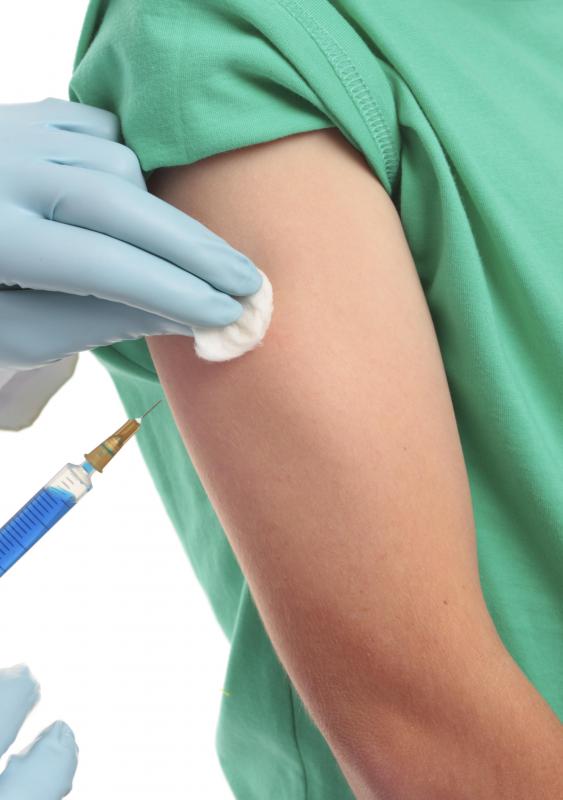At TheHealthBoard, we're committed to delivering accurate, trustworthy information. Our expert-authored content is rigorously fact-checked and sourced from credible authorities. Discover how we uphold the highest standards in providing you with reliable knowledge.
What Are the Treatments for Vagus Nerve Disorders?
The vagus nerves both originate at the brain stem, but each then runs down the side of the neck to destinations such as the heart and the intestines. These nerves play a part in regulating breathing, heart rate and digestion. Patients with vagus nerve disorders may have a variety of symptoms, including low blood pressure, irregular heart rhythms, difficulty in swallowing and digestive problems. Treatment is often limited to reducing or eliminating the symptoms through exercise and short- or long-term medication, but surgical intervention may be required as well.
Exercises for vagus nerve disorders normally involve the pharynx, the area of the throat between the mouth and the larynx. The patient may also be taught how to exercise the soft palate, or the area at the top of the mouth. Through a combination of vocalizations, breathing techniques and movements, the exercises may stimulate the vagus nerves, thereby alleviating some of the symptoms.

Patients with vasovagal syncope commonly experience fainting spells when subjected to psychological distress, which may be triggered by viewing a disturbing scene or experiencing an emotional shock. This is one of the vagus nerve disorders that might benefit from medications. Doctors may prescribe drugs to regulate the patient's blood pressure or antidepressants such as sertraline or paroxetine.

Vagus nerve disorders also include gastroparesis, a disorder in which the stomach does not have sufficient muscle contractions to move food along the intestines properly. If severe, it may be necessary to insert a feeding tube in order to place nutrients into the intestine without first entering the stomach. If the patient is experience nausea or vomiting, medications such as ondansetron may be beneficial. Because of the significant risks associated with medications such as metoclopramide, which is used to stimulate the muscles of the stomach, doctors normally reserve this option for the most severe cases.

Surgical solutions for these disorders depend on the nature of the symptoms the patient is experiencing. Some patients with gastroparesis may be candidates for stomach staples or stomach bypass surgery. If the disorder affects the heart rate or rhythm, it may be necessary to implant a pacemaker to regulate cardiac functions.
Although many patients with vagus nerve disorders require little or no treatment, the disorders can pose significant risk. For example, some people can have a vagus nerve disorder in which the brain never receives a signal notifying it that the individual is hungry and needs to eat. Without a hunger signal, the patient could literally starve; although this almost never happens, the patient's nutrition can be negatively impacted.
AS FEATURED ON:
AS FEATURED ON:





















Discussion Comments
@anon964555 Thank you.
Benzodiazepines destroy the vagus nerve, brain, spinal cord and digestive system. What does anybody suggest that helps rebuild?
Does the vagus nerve control the response of brain stimulation and whether it leads to syncope?
Try ujjayi pranayam to heal your vagus nerve. You will thank me.
I had Rocky Mountain Spotted Tick Fever in the summer of 2012. A short time after being diagnosed I started having vaso-vagal disorder symptoms which have continued for over a year as of June, 2013. I am convinced that the RMSTF caused the vaso-vagal problems, but the doctor never commits to a yes or no answer when I ask specifically if the tick fever caused the disorder.
@anon321337: I suggest you check out Lyme disease, which will cause the vagus nerve to go awry and cause all the symptoms you describe. You can check out the symptoms online.
I've found homeopathy unclogs the salivary glands very well, as well as helping with all of my symptoms.
I tried the raw garlic treatment for constipation, eating two raw cloves, and now I've had extremely slow digestion for the last five days.
I have aching discomfort on the left side of my chest and abdomen. My left tonsil feels enlarged and like something is stuck in it. The left side of my digestive area also feels like something's stuck in it. I am having sore throats, body twitches, insomnia, hear secretions of the left side of my throat only, anxiety, depression, panic, nervousness, brain fog. I feel sick most of the time, with salivary stones on both sides, dizziness and some nausea. I just feel sick all over.
Are these disorders curable?
Post your comments